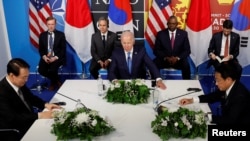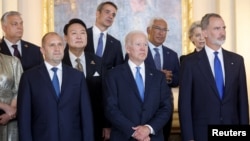U.S. President Joe Biden and the leaders of South Korea and Japan expressed new worries Wednesday about the North Korean nuclear threat as they met on the sidelines of the NATO summit in Madrid.
In brief comments ahead of their trilateral meeting, Biden said, “We remain deeply concerned [that North Korea] has continued escalatory ballistic missiles and tests and [has the] potential to conduct a nuclear test.”
Biden said the United States, South Korea and Japan have a “shared objective, including a complete denuclearization of the Korean Peninsula, and a free and open Indo Pacific.”
South Korean President Yoon Suk Yeol said North Korea’s “nuclear and missile threats continue to evolve. And the global landscape is facing increased uncertainties, thereby rendering our trilateral partnership all the more significant.”
Japanese Prime Minister Fumio Kishida said he was “deeply concerned over the possibility of further provocation by North Korea, including nuclear testing. Through this meeting, I hope that trilateral cooperation regarding our response to North Korea will be solidified.”
A subsequent White House statement about the meeting said Biden “underscored the United States’ unshakable commitment to the defense” of both Japan and South Korea.
At a dinner Tuesday hosted by Spain’s King Felipe VI, Yoon and Kishida expressed hopes for improved bilateral relations between their two countries during a three or four-minute meeting, according to the South Korean presidential office.
Yoon told Kishida he plans to “resolve pending issues between Korea and Japan as soon as possible” so that the two countries can “move forward in a future-oriented manner,” Seoul officials said.
Kishida said he hoped the South Korean president would restore “extremely severe relations” to a “healthy state,” according to Japan’s Kyodo news agency.
It was the first face-to-face meeting between the top leaders of South Korea and Japan since December 2019. Since then, ties have plummeted due to lingering disputes related to Japan’s brutal 1910-1945 occupation of Korea.
Yoon, who took office last month, is a conservative who has promised greater cooperation with Japan on issues such as North Korea, which has accelerated its nuclear weapons development.
Yoon and Kishida, who have both aligned their countries in a more explicitly pro-Western direction, are attending the NATO meeting as observers. It is the first time the top leaders of South Korea and Japan have attended a NATO summit.
On Wednesday, Yoon and Kishida will meet U.S. President Joe Biden for a trilateral summit in Madrid. The meeting will focus mainly on North Korea, according to White House National Security Advisor Jake Sullivan.
South Korea and Japan are both key allies of the United States, but are often suspicious of each other. Occasional flare-ups in the countries’ historical disputes have posed a major challenge to trilateral cooperation on issues such as North Korea or China.
The latest round of tensions was sparked in part by recent South Korean court rulings ordering Japanese companies to compensate Koreans who were forced to work during Japan’s colonial occupation of Korea.
Japan says the reparations issue was resolved with a 1965 treaty that normalized Japan-South Korea relations. It has complained that subsequent South Korean governments have not accepted further Japanese apologies and attempts to make amends.
Japanese and South Korean officials had hinted that Yoon and Kishida may hold a longer meeting on the sidelines of the NATO summit. But subsequent media reports indicated that more substantive engagement may have to wait until Japan holds key upper house elections next month.








